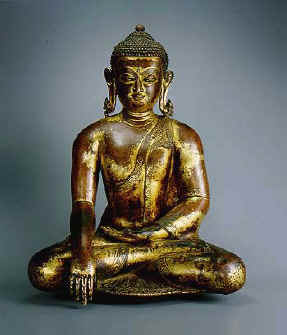
"The thorough clarification of the meaning of birth and death, this is the most
important problem of all for Buddhists."
Extracts from a text
by Mizuno Yaoko
Becoming aware of one's own correct action and
acquiring the ability to live as the Buddha lived is not necessarily achieved through
listening to many sermons nor by memorizing many words. Even a person who has heard
numerous sermons and studied the teachings of Buddhism extensively can achieve salvation
by reading only a four-phrase poem from a sutra.
It means: Do not perform evil acts. Value all
virtues. If you do you will calm your own heart.
Pai Chu-i said, "Do not do evil. Do good. A
three-year-old could probably say that." Dorin Zenji responded, "Even though a
three-year-old can say it, a man of eighty can probably not practice it."
What is living? Because all of us are alive we do
not strive to find the final answer to the question, "What is the real reason that we
live here in this way?" Some people would probably answer that we are alive because
we were born. But nobody actually knows personally that he or she was born. You think that
you were born at a particular time because your parents and other people tell you that you
were, or because there is an entry in your family register which states that you were.
It is not true that I am living here now because at a certain time I was born. I believe
that I was born into this world because I am living here now. But I was not born at my own
discretion. I was not born because my parents wanted me to be born. The perfection and the
mystery of the birth of children as living beings is beyond parents' understanding. It
could be said that because the earth gives life, the earth is linked to the life of the
universe, therefore, we cannot comprehend the life which we receive.
Living beings all die. This is a truth impossible
to deny. Siddhartha was a man with unlimited talents born in circumstances which provided
him with everything anyone could possibly desire. But having seen death, aging, and
illness, he could never be content. Buddhism began because he spent his life gravely
focussing his attention on his death which was certain to come.
We, who did not desire to be born, were born, and,
therefore, we must face death, a prospect which terrifies us. If death is unavoidable,
life itself is the origin of suffering. Is there a way to escape this suffering?
Shakyamuni Buddha left his royal palace for the mountains where he devoted six years to
ascetic practices and six more years to meditation so he could give us the answer to that
question.
After attaining Buddhahood, he returned to the
palace to teach Buddhism, but he did not resume a life dependent upon material
possessions, honor, and rank. He now believed that the best way to spend his life was to
limit his possessions to a monk's sanne, the three types of kasaya (samghati,
uttarasamga and antarvasa kasaya): an eating bowl (oryoki), to
obtain food from religious mendicancy, and to live either under a tree or on top of a
stone. He taught us through personal example that a person could lead the most noble life
possible with a minimum amount of food and clothing, and the simplest imaginable dwelling.
He taught us that we who live, thanks to life
bestowed upon us by Heaven, suffer more if we devote our lives to the pursuit of
possessions than we do by not having anything.